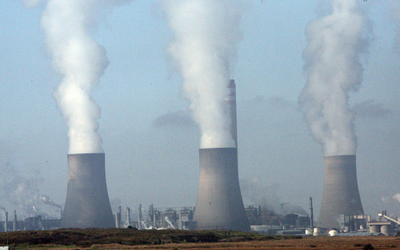PETROCHEMICAL giant Sasol said on Thursday its profit for the six months to December would decline by almost a third, making it the latest to be hit by decade-low oil prices.
Headline earnings would drop by between R7.36 per share and R8.96 when it reports interim results in March. That is down from R32 a share in the same period last year.
Oil has slid steadily for more than a year and hit new depths since the start of this year.
On Thursday, however, the price of Brent crude oil — an international benchmark — jumped as much as 8% to $35.13 a barrel, after Russia’s energy minister, Alexander Novak, said Saudi Arabia — the largest producer of the fuel — proposed a 5% production cut by the Organisation of the Petroleum Exporting Countries (Opec).
Saudi Arabia has the most influential vote in the cartel of 13 nations that supplies about 40% of the world’s oil needs. Sasol’s shares climbed as much as 7.2% after Mr Novak’s comments, before closing 4.6% higher at R425.
The price of oil had dropped more than 70% since July 2014, said Opec secretary-general Abdalla el-Badri on Monday. "The pain of this readjustment is being felt across the industry," said Mr Badri, according to the Opec website. "These are tough times."
In that period, Sasol’s shares have fallen from an all-time high of R653 to hit a low of R354 last week as the oil price fell below $27 per barrel.
The company relies on the oil market price for the vehicle fuel it produces from natural gas and coal, among other chemicals. The company’s basket of chemicals had declined 23% compared to a year earlier, Sasol said.
Its business had been "negatively impacted by challenging and highly volatile global markets, marked by a steep decline in global oil and commodity chemical prices, partly offset by a weaker rand exchange rate", Sasol said.
However, the rand weakened an average 24% in the comparable period, to R13.62 to the dollar by the end of last month, helping to offset the lower oil and chemicals prices. It has since weakened sharply to R16.14, continuing to cushion the company against the low oil price.
A large part of Sasol’s inputs such as coal are denominated in rand, but it sells the end product at oil market prices that are in dollars.
Sasol has commenced a cost-cutting exercise through which it aims to save R4.3bn by the end of this financial year.
On Thursday, the company said the programme "continues to progress very well, and we are on track to exceed our sustainable cost-savings target for the current financial year".
Cutting oil production will help suck up the excess supply that Opec has been counting on to choke most of the US’s high-cost shale oil producers that turned the world’s largest oil consumer into an energy self-reliant economy for the past four years.
Producers such as Saudi Arabia, Nigeria and Russia can sustain the lowest oil prices, as their abundant resources do not require the expensive technology that producers in the US need to extract the fuel from deep in the ground. Many energy companies including BP, have already announced hefty job cuts as a result of the low oil prices.
The governments of the major oil-producing countries have had to cut their expenditure plans, as economic growth has faltered with the decline in oil prices. Nigeria, Equatorial Guinea and Angola, Africa’s major producers, have also had to revise their budgets downwards.
With Reuters
PUBLISHED IN BUSINESS DAY – NO REPUBLICATION RIGHTS

Sasol’s plant in Secunda. Picture: SOWETAN
PETROCHEMICAL giant Sasol said on Thursday its profit for the six months to December would decline by almost a third, making it the latest to be hit by decade-low oil prices.
Headline earnings would drop by between R7.36 per share and R8.96 when it reports interim results in March. That is down from R32 a share in the same period last year.
Oil has slid steadily for more than a year and hit new depths since the start of this year.
On Thursday, however, the price of Brent crude oil — an international benchmark — jumped as much as 8% to $35.13 a barrel, after Russia’s energy minister, Alexander Novak, said Saudi Arabia — the largest producer of the fuel — proposed a 5% production cut by the Organisation of the Petroleum Exporting Countries (Opec).
Saudi Arabia has the most influential vote in the cartel of 13 nations that supplies about 40% of the world’s oil needs. Sasol’s shares climbed as much as 7.2% after Mr Novak’s comments, before closing 4.6% higher at R425.
The price of oil had dropped more than 70% since July 2014, said Opec secretary-general Abdalla el-Badri on Monday. "The pain of this readjustment is being felt across the industry," said Mr Badri, according to the Opec website. "These are tough times."
In that period, Sasol’s shares have fallen from an all-time high of R653 to hit a low of R354 last week as the oil price fell below $27 per barrel.
The company relies on the oil market price for the vehicle fuel it produces from natural gas and coal, among other chemicals. The company’s basket of chemicals had declined 23% compared to a year earlier, Sasol said.
Its business had been "negatively impacted by challenging and highly volatile global markets, marked by a steep decline in global oil and commodity chemical prices, partly offset by a weaker rand exchange rate", Sasol said.
However, the rand weakened an average 24% in the comparable period, to R13.62 to the dollar by the end of last month, helping to offset the lower oil and chemicals prices. It has since weakened sharply to R16.14, continuing to cushion the company against the low oil price.
A large part of Sasol’s inputs such as coal are denominated in rand, but it sells the end product at oil market prices that are in dollars.
Sasol has commenced a cost-cutting exercise through which it aims to save R4.3bn by the end of this financial year.
On Thursday, the company said the programme "continues to progress very well, and we are on track to exceed our sustainable cost-savings target for the current financial year".
Cutting oil production will help suck up the excess supply that Opec has been counting on to choke most of the US’s high-cost shale oil producers that turned the world’s largest oil consumer into an energy self-reliant economy for the past four years.
Producers such as Saudi Arabia, Nigeria and Russia can sustain the lowest oil prices, as their abundant resources do not require the expensive technology that producers in the US need to extract the fuel from deep in the ground. Many energy companies including BP, have already announced hefty job cuts as a result of the low oil prices.
The governments of the major oil-producing countries have had to cut their expenditure plans, as economic growth has faltered with the decline in oil prices. Nigeria, Equatorial Guinea and Angola, Africa’s major producers, have also had to revise their budgets downwards.
With Reuters
PUBLISHED IN BUSINESS DAY – NO REPUBLICATION RIGHTS






















Change: -1.02%
Change: -1.10%
Change: -1.83%
Change: -1.03%
Change: -0.45%
Data supplied by Profile Data
Change: -1.00%
Change: -0.18%
Change: -1.01%
Change: 0.00%
Change: -0.20%
Data supplied by Profile Data
Change: 0.11%
Change: 0.14%
Change: 0.27%
Change: 0.38%
Change: 0.34%
Data supplied by Profile Data
Change: 0.04%
Change: 0.51%
Change: -0.32%
Change: 1.60%
Change: 1.24%
Data supplied by Profile Data